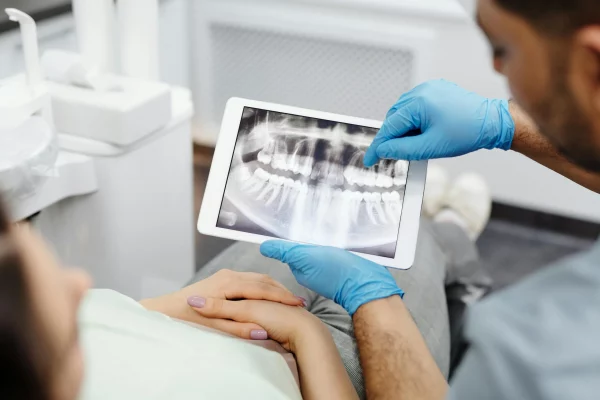Your dental checkup does far more than simply clean your teeth—it plays a vital role in protecting your overall health. Many people mistakenly believe that if their teeth feel fine, there’s no need for a visit. In reality, regular checkups allow dentists to catch problems long before they become painful, expensive, or irreversible.
At G&P Dental, we emphasize preventive care as the foundation of long-term oral health. Let’s explore why dental checkups are so critical, what you can expect during your visit, and how staying consistent can help you avoid serious complications.
The Importance of Routine Dental Checkups
Neglecting regular dental checkups might initially appear inconsequential, particularly when no immediate discomfort is evident. Yet, oral health issues such as cavities, periodontal disease, enamel deterioration, and even oral cancers often begin subtly and can progress without noticeable symptoms in their early stages. Routine dental examinations enable professionals to identify these conditions at their onset, making interventions less complex, less invasive, and typically more cost-effective.
Moreover, the significance of dental visits extends beyond the preservation of teeth and gums. There is substantial evidence linking oral health to systemic conditions, including cardiovascular disease, diabetes, and cognitive decline. Consistency in attending dental checkups not only maintains oral health but also contributes to broader, long-term well-being. Preventive care, in this context, remains more effective and less burdensome than corrective measures.
Early Detection of Cavities and Gum Disease
Dental issues such as cavities and gum disease often progress silently, without obvious discomfort or visible warning signs—essentially going unnoticed until substantial damage has occurred. Regular dental checkups, therefore, play a critical role. During these appointments, dental professionals conduct comprehensive assessments of the teeth, gums, and surrounding tissues. They look for early indications of decay, inflammation (like gingivitis or periodontitis), gum recession, and accumulations of plaque or tartar. Early identification of these conditions enables less complex and more conservative treatments, ultimately supporting the preservation of natural teeth and promoting sustained oral health.
Preventing Long-Term Health Complications
Oral health is intrinsically linked to overall systemic health, a fact often underestimated. Neglected dental infections or persistent gum inflammation can serve as catalysts for a variety of serious medical conditions including cardiovascular disease, stroke, complications associated with diabetes, respiratory illnesses, and even unfavorable pregnancy outcomes. Regular dental examinations constitute a straightforward yet highly effective measure for mitigating these broader health risks, all while preserving the integrity of one’s teeth and gums. In short: safeguarding oral health is, quite literally, an investment in your general well-being.
What Happens During a Routine Dental Checkup Exam?
Many people tend to overlook the true extent of a dental checkup; it encompasses far more than a routine cleaning. In reality, dental appointments involve a multifaceted evaluation of one’s oral health. During such visits, dental professionals examine teeth for evidence of decay, assess the gums for inflammation or early manifestations of periodontal disease, and evaluate the function and alignment of the jaw and bite.
In addition, practitioners may conduct oral cancer screenings, review the status of any existing dental restorations, and utilize radiographs (X-rays) to uncover underlying issues that are not visible to the naked eye. This comprehensive approach is designed to identify potential problems at an early stage, facilitate preventive treatment, and ultimately promote long-term oral health. By adopting such thorough evaluative measures, the dental team is able to support the maintenance of a healthy and resilient smile over time.
Comprehensive Oral Exam and Professional Cleaning
During a standard dental appointment, the initial phase generally involves a thorough visual inspection of the teeth, aimed at detecting cavities, signs of wear, or other forms of damage. The dentist also assesses the health of the gums, observing for inflammation or bleeding, while evaluating bite alignment and jaw function to identify any irregularities. Additionally, a careful examination of the oral tissues is conducted to screen for abnormalities or lesions.
Following the examination, a dental hygienist carries out a professional cleaning. This process includes the removal of hardened tartar (calculus) and plaque build-up, as well as polishing of the enamel to reduce surface stains. In certain cases, a fluoride treatment may be administered, offering supplementary protection against tooth decay. Collectively, these professional procedures extend beyond the capabilities of routine at-home oral care, targeting areas and issues that daily brushing and flossing may not adequately address.
X-Rays, Screenings, and Detailed Risk Assessments
Based on your dental history and current oral health, your appointment may involve several additional diagnostic evaluations. Digital X-rays are often utilized to detect underlying cavities or bone loss that are not observable during a standard visual examination. Oral cancer screenings are routinely performed to identify any abnormal lesions or tissue changes at an early, more treatable stage. Periodontal assessments, which involve measuring the depth of gum pockets, help monitor for signs of gum disease. Additionally, TMJ evaluations are conducted to assess the health and function of the jaw joints. Once these assessments are completed, the dentist will review the findings with you, discuss any concerns, and recommend preventive measures or treatment options tailored to your specific needs.
How Often Should You Visit for a Dental Checkup?
The widely cited recommendation to visit the dentist every six months serves as a general framework, but it’s not universally applicable. Individuals with consistently healthy teeth and gums may find that biannual checkups are sufficient. In contrast, those with a history of periodontal disease, frequent cavities, or other oral health concerns often require more frequent monitoring—sometimes every three to four months. Dental professionals assess each patient’s risk factors, dental history, and current oral condition to determine an appropriate appointment schedule. This individualized approach aims to maintain oral health and facilitate early detection of potential issues.
Recommended Frequency for Adults and Children
- Adults: Every 6 months is ideal for most people. This schedule helps manage plaque buildup, catch decay early, and monitor gum health.
- Children: Pediatric visits often start when the first tooth appears. Regular checkups from infancy through adolescence support healthy oral development and build positive dental habits.
Special Considerations for Patients with Oral Health Risks
Some individuals may need more frequent checkups, such as:
- Smokers
- Diabetics
- Pregnant women
- Patients with gum disease
- Individuals with a history of cavities or restorations
At G&P Dental, we create personalized recall schedules based on your specific risk profile to ensure you receive the care you need.
Why GP Dental Checkup Provides More Than Just Clean Teeth
A dental examination at G&P Dental extends well beyond routine cleaning procedures. The practice adopts a comprehensive approach, recognizing the integral relationship between oral and systemic health. Each visit involves a thorough evaluation encompassing the teeth, gingival tissues, occlusal relationships, and temporomandibular joint function. Additionally, screenings are conducted for early indicators of oral malignancies and systemic conditions that may present with oral manifestations.
G&P Dental employs advanced diagnostic modalities, such as digital radiography and periodontal assessments, to facilitate early identification of potential concerns. The clinical team prioritizes patient education, providing clear explanations of diagnostic findings and outlining individualized preventive or therapeutic strategies as appropriate. Central to G&P Dental’s philosophy is the belief that informed patients are better equipped to manage their long-term oral and overall health. The practice is committed to supporting patients through each stage of their oral healthcare journey.
Holistic Care with a Focus on Prevention and Education
Prevention undeniably surpasses treatment in importance. During each checkup, we prioritize patient education—demonstrating effective brushing and flossing, and reviewing daily habits essential for maintaining oral health. Additionally, we discuss dietary choices and their impact on teeth and gums, as well as address lifestyle factors such as teeth grinding or clenching that may contribute to dental concerns. When indicated, we suggest preventive measures such as dental sealants or fluoride treatments to enhance protection against cavities. Our emphasis on education and early intervention is designed to reduce the likelihood of future dental problems and support sustained oral health.
Personalized Treatment Plans Based on Your Oral Health
Every patient’s oral health needs are distinct, so we develop a tailored care plan for each individual. We take into account your dental history, current health status, and long-term objectives—whether those involve aesthetics, restorative treatments, or preventive measures. Whether you are addressing periodontal concerns, considering orthodontic solutions, or simply aiming to preserve your oral health, our individualized approach ensures you receive the most suitable and effective care throughout every phase of your dental health journey.
Frequently Asked Questions (FAQs)
1. How often should I get a dental checkup?
For most adults and children, every six months is ideal. This allows your dentist to clean your teeth, check for early signs of decay or disease, and address concerns before they become serious. High-risk patients may need more frequent visits, while those with excellent oral health might extend intervals slightly with their dentist’s guidance.
2. Is dental checkup really necessary if my teeth feel fine?
Yes. Many dental problems develop quietly, without pain or noticeable symptoms until advanced stages. Regular checkups allow your dentist to detect issues like cavities, gum disease, or bite problems before you experience discomfort. Early detection means easier, less invasive, and more affordable treatment.
3. Does dental checkup includes oral cancer screenings?
Absolutely. Your dentist will examine your mouth, tongue, cheeks, and throat for signs of abnormal tissue growth, sores, or lesions that could indicate early stages of oral cancer. Regular screenings significantly increase the chances of detecting and treating oral cancer early, improving outcomes.
4. Are dental X-rays safe?
Yes. Modern digital X-rays use minimal radiation and are considered extremely safe, even for children and pregnant women (with proper precautions). X-rays allow your dentist to see beneath the surface of teeth and gums, helping to detect hidden decay, bone loss, infections, or impacted teeth that may not be visible during a visual exam.
5. What if I have dental anxiety?
You’re not alone, many patients feel nervous about dental visits. At G&P Dental, we take the time to explain each step, answer your questions, and offer options such as relaxation techniques, gentle care, and sedation if needed. Our compassionate approach helps make your visit comfortable and stress-free.
Neglecting your dental checkup today could lead to costly, painful problems tomorrow. Regular exams are one of the most effective ways to protect your teeth, gums, and overall health for years to come. Don’t wait for symptoms to appear before taking action. Schedule your dental checkup with G&P Dental now and enjoy peace of mind knowing your oral health is in expert hands. Call us or book your appointment online today.


